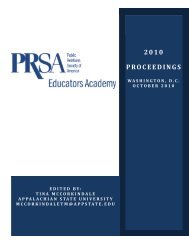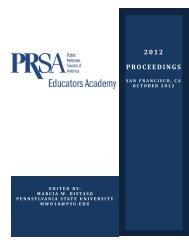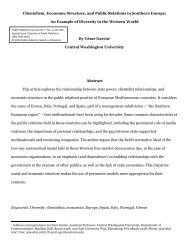2008 PROCEEDINGS - Public Relations Society of America
2008 PROCEEDINGS - Public Relations Society of America
2008 PROCEEDINGS - Public Relations Society of America
Create successful ePaper yourself
Turn your PDF publications into a flip-book with our unique Google optimized e-Paper software.
If you’re going to work with [company], you’re going to get involved in the<br />
community, so that means you’re going to spend some money on a local charity.<br />
And then we can put them up for awards. If they are looking for the kind <strong>of</strong> face<br />
that they want to put out in the community, they are going to know what we<br />
expect. We can’t obviously force them, but we say, “If you want a good<br />
opportunity, you’ve got [local event], you’ve got 30,000 people and you should<br />
put $10,000 toward that.” Or, “This is a good place to spend money at this local<br />
school. It’s only $500, but you’re going to get a lot <strong>of</strong> good will from it.”<br />
Another practitioner exposed a rift in ethical intent and action when she decided to fully<br />
report on her actions not because <strong>of</strong> her duty to remain honest, but due to a fear <strong>of</strong> being caught<br />
by the client. She stated,<br />
We have to document all <strong>of</strong> our outreach. It's repetitive work because you have to<br />
do the pitch, then you have to email it to your boss, and we also have an online<br />
database where we keep all our outreach and logged calls. There are days where I<br />
don’t want to do it, but we have to because I know our client could ask for a list <strong>of</strong><br />
what we did.<br />
Results <strong>of</strong> the second research question reveal a lack <strong>of</strong> experience with and thorough<br />
understanding <strong>of</strong> deontological public relations decision making models.<br />
Discussion<br />
Findings suggest that public relations practitioners make ethical decisions by respecting<br />
others, communicating honestly, and relying on the assistance <strong>of</strong> industry pr<strong>of</strong>essionals. Results<br />
also reveal that pr<strong>of</strong>essionals evaluate deontological decision making models as difficult to<br />
uphold due to the <strong>of</strong>ten situational, rushed and constrained nature <strong>of</strong> their work. In some cases,<br />
due to lack <strong>of</strong> experience or client demands, practitioners not only failed to utilize a<br />
deontological decision making procedure, but also failed to rely upon any form <strong>of</strong> ethical<br />
thinking.<br />
The first research question addressed how public relations pr<strong>of</strong>essionals make ethical<br />
decisions. All participants mentioned that their decisions consider coworkers and journalists, as<br />
well as utilize honest communication and business practices. Interestingly, themes reflected two<br />
tenets <strong>of</strong> the deontological theory <strong>of</strong> ethical issues management and public relations:<br />
maintenance <strong>of</strong> others’ dignity and respect and moral duty. These two concepts serve as core<br />
steps within the deontological models explored in the second research question. A third theme,<br />
practitioners’ use <strong>of</strong> decision making protocol and personal guidance, reflects a preference for<br />
making decisions based on an organizational philosophy, troubleshooting framework, or the<br />
wisdom <strong>of</strong> more experienced pr<strong>of</strong>essionals. This suggests that practitioners, especially those with<br />
less experience or technical roles, may benefit from a deontological model <strong>of</strong> public relations<br />
ethics to further assist them during the decision making process.<br />
The second research question addressed how public relations practitioners make meaning<br />
<strong>of</strong> deontological models <strong>of</strong> public relations. Although respondents identified with several<br />
deontological concepts and used them to counsel clients, some practitioners in agency<br />
environments argued that step-by-step deontological models do not accurately reflect their<br />
current method <strong>of</strong> ethical decision making. Perhaps a circular model or non-ordered checklist <strong>of</strong><br />
deontological ethical decision making could better apply to these current pr<strong>of</strong>essionals’ needs.<br />
Furthermore, differences in practitioner actions and the motivations behind those actions reveal a<br />
discord between the public relations pr<strong>of</strong>ession and pure, duty-based ethical decision making.<br />
101
















